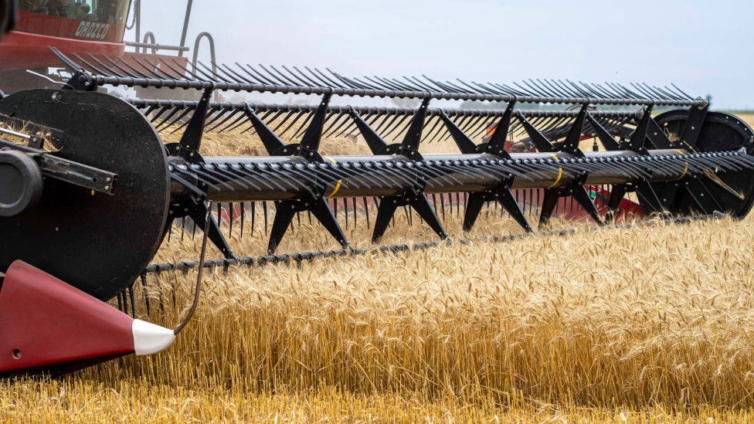The world is facing a "human catastrophe" from a food crisis arising from Russia's invasion of Ukraine, according to the President of the World Bank, David Malpass.
In an interview with BBC economics editor Faisal Islam, Mr Malpass, who leads the institution charged with global alleviation of poverty, warned that record rises in food prices would push hundreds of millions of people into poverty and lower nutrition if the crisis continues.
"It's a human catastrophe, meaning nutrition goes down. But then it also becomes a political challenge for governments who can't do anything about it, they didn't cause it, and they see the prices going up," he said on the sidelines of the IMF-World Bank meetings in Washington.
The World Bank calculates there could be a "huge" 37% increase in food prices, which is "magnified for [the] poor", who will "eat less and have less money for anything else such as schooling. And so that means that it's really an unfair kind of crisis. It hits the poorest the hardest. That was true also of Covid".
The price rises are broad and deep, he said: "it's affecting food of all different kinds oils, grains, and then it gets into other crops, corn crops because they go up when wheat goes up".
There was enough food in the world to feed everybody, he said, and global stockpiles are large by historical standards, but there will have to be a sharing or sales process to get the food to where it is needed.
Mr Malpass also discouraged countries from subsidising production or capping prices.
Instead, he said, the focus needed to be on increasing supplies across the world of fertilisers and food, alongside targeted assistance for the very poorest people.
The World Bank chief also warned of a knock on "crisis within a crisis" arising from the inability of developing countries to service their large pandemic debts, amid rising food and energy prices.
"This is a very real prospect. It's happening for some countries, we don't know how far it'll go. As many as 60% of the poorest countries right now are either in debt distress or at high risk of being in debt distress," he said.
"We have to be worried about a debt crisis, the best thing to do is to start early to act early on finding ways to reduce the debt burden for countries that have unsustainable debt, the longer you put it off, the worse it is," he added.
Latest Stories
-
Managing Prediabetes with the Help of a Dietitian
8 mins -
Joy FM listeners criticise Achiase Commanding Officer’s election comment
29 mins -
Legal Aid Commission employees threaten strike over poor working conditions
31 mins -
Ghana ranked 7th globally as biggest beneficiary of World Bank funding
41 mins -
IMF board to disburse $360m to Ghana in December after third review
45 mins -
Former Bono Regional NPP organiser donates 13 motorbikes to 12 constituencies
51 mins -
Securities industry: Assets under management estimated at GH¢81.7bn in quarter 3, 2024
56 mins -
Gold Fields Ghana Foundation challenges graduates to maximise benefits of community apprenticeship programme
2 hours -
GBC accuses Deputy Information Minister Sylvester Tetteh of demolishing its bungalow illegally
3 hours -
Boost for education as government commissions 80 projects
3 hours -
NAPO commissions library to honour Atta-Mills’ memory
3 hours -
OmniBSIC Bank champions health and wellness with thriving community walk
3 hours -
Kora Wearables unveils Neo: The Ultimate Smartwatch for Ghana’s tech-savvy and health-conscious users
3 hours -
NDC supports Dampare’s ‘no guns at polling stations’ directive
3 hours -
Police officer interdicted after video of assault goes viral
3 hours

